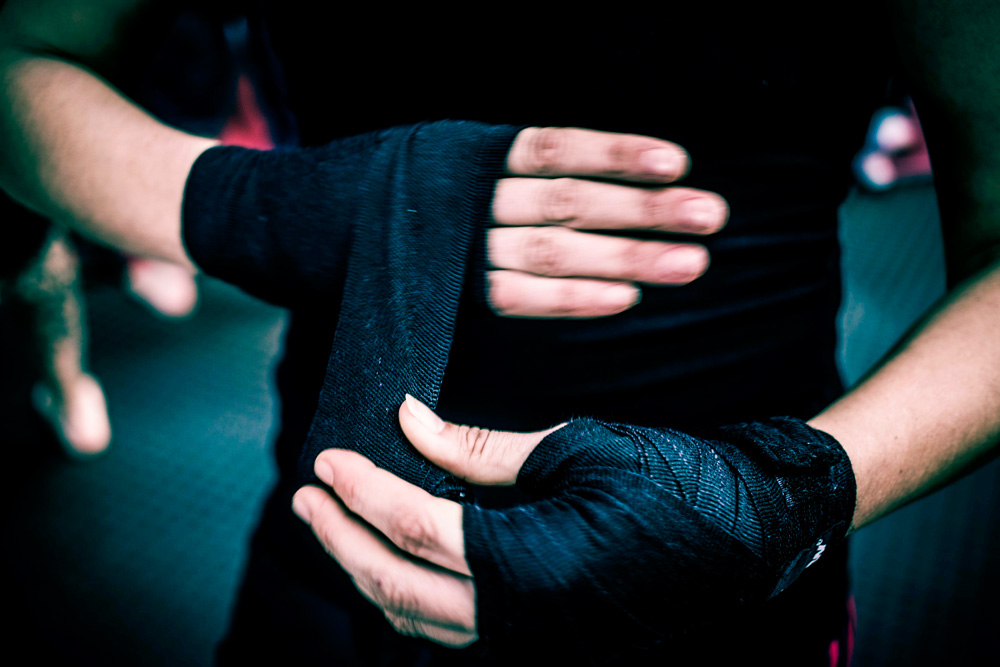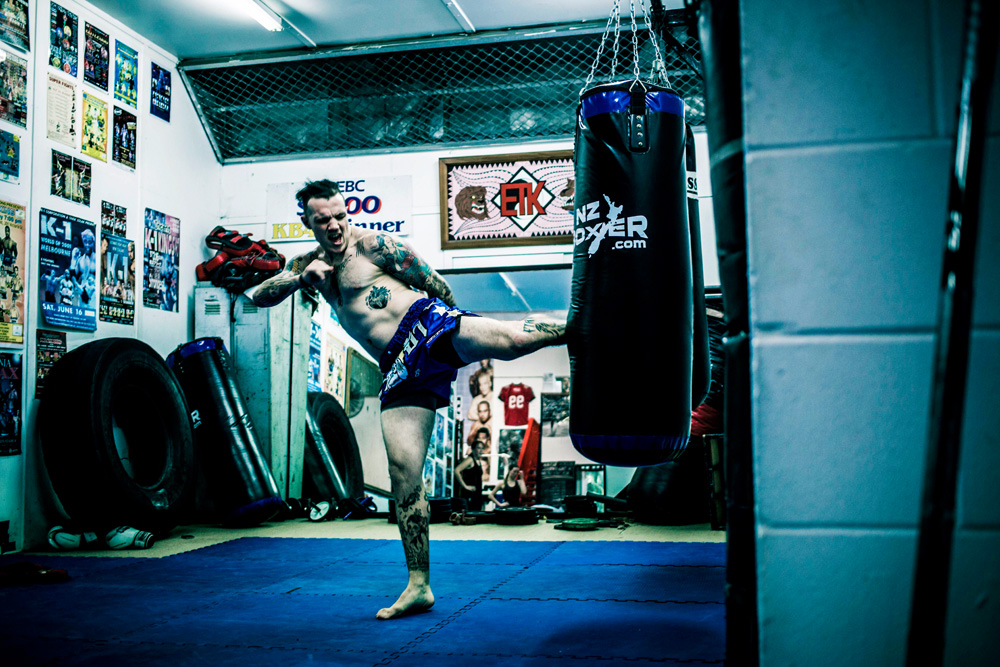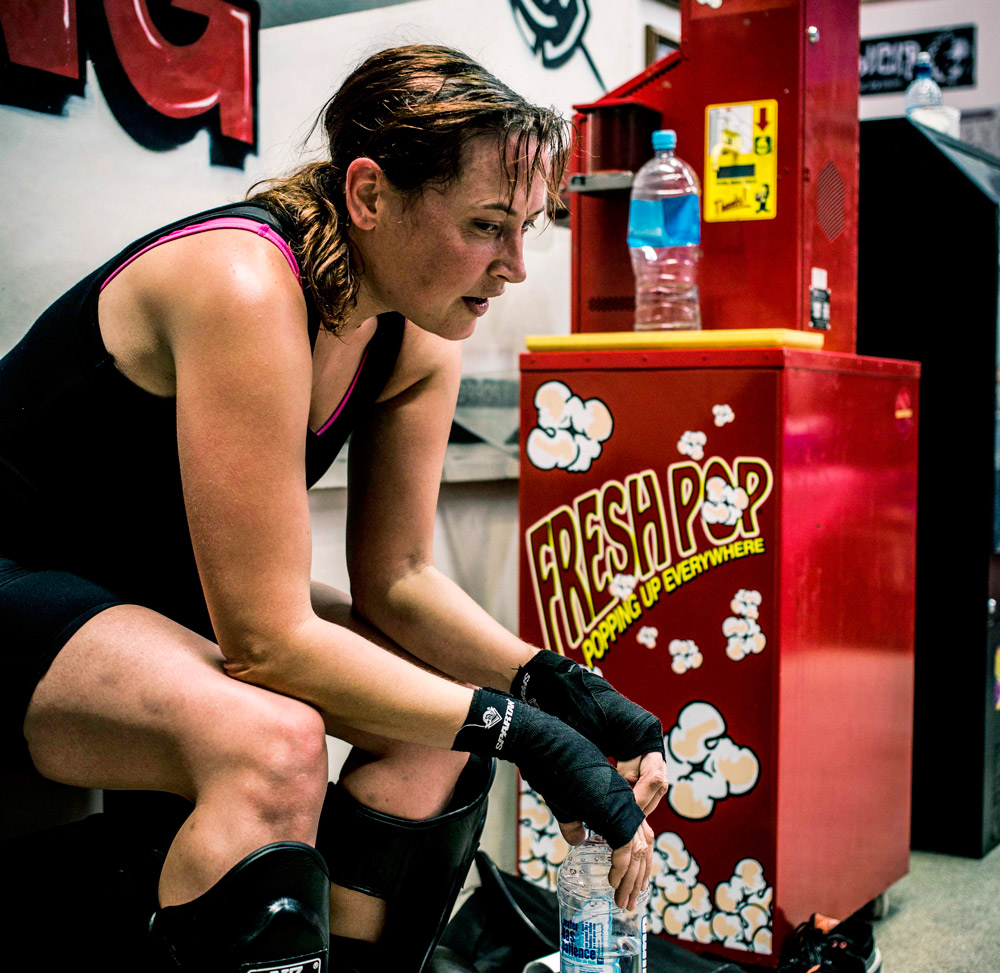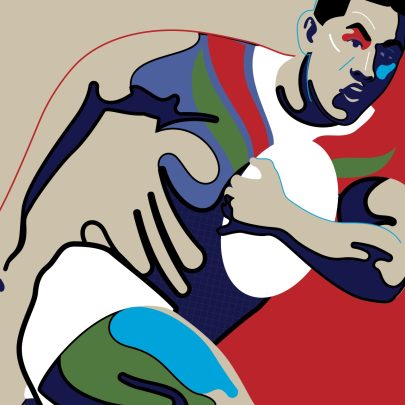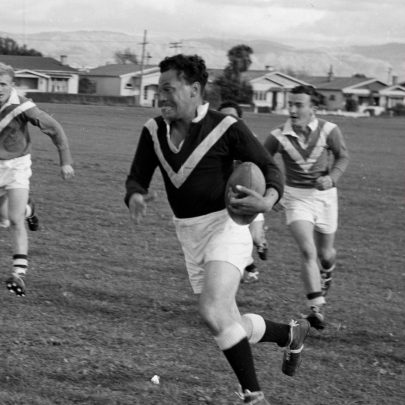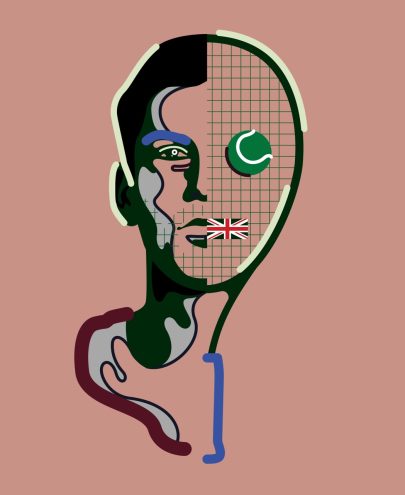Aug 22, 2014 Sport
What does it take to get in the ring and hit people and invite them to hit you?
Photos: Vicki Leopold.
I’ve lost count of the number of times Richie Hardcore has hit me in the face.
He stands 20cm taller than me and weighs about 25kg more. He could easily knock me out cold, and right now I want to run away. I can’t stop the tears. I drop my arms in surrender, and turn away.
“No way,” he says in an exasperated whisper. “Don’t do this to me.” He gestures towards the group of people on my right.
“Don’t you cry in front of all these people.”
The girls I’ll be sparring with are all a lot tougher and meaner than me. I realise I’m really scared.
Richie has been teaching me Muay Thai kickboxing for close to a year now and it’s not the first time I’ve disappointed him. He throws a kick and his bright-blue shin guard connects directly with my bad right hip, injured a few weeks back. The buzzer of his timer goes, thank god, and I get a brief reprieve. Then we’re back to it.
“Hands up,” Richie demands, and jabs at my face again.
In a few days’ time, I’m supposed to be sparring with a group of women I don’t know. The pain in my hip is getting worse. My left ankle is swelling and my right foot is tingling with nerve pain. My face stings from Richie’s hits and my head is pounding. I haven’t had a proper sleep in a week. I don’t want to fail but I know I’m going to and I can’t cope with that. The girls I’ll be sparring with are all a lot tougher and meaner than me. More than anything, I realise I’m really scared.
Richie’s got a tattoo in Spanish on his arm. It says, “I pray another world is possible.”
Later, in the safety of my car, I break down.
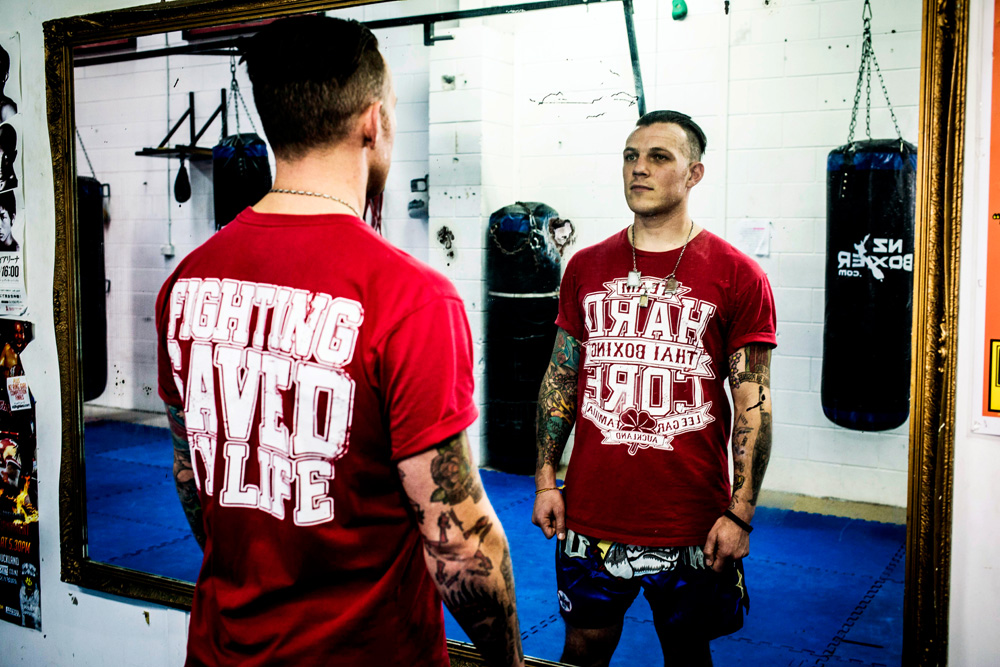
The idea came about 10 months ago and, like many of my decisions made over a beer, it seemed like a good one. I was 32, a heavy smoker, an occasional binge-drinker, and when I visited the gym it was mostly because the cafe next door makes great coffee. I wanted to know if a non-fighter could be trained to be one.
Friends told me to get hold of Richie Hardcore. I didn’t know much about him, but I asked around. Richie was 34, a retired Muay Thai fighter, born with the name Richard Steward; he legally added the middle name “Hardcore” a few years back. As I was to discover, his arms and legs were heavily tattooed in reds and blues and the word “HARDCORE” was set in permanent black ink across his chest. His perfectly styled hair, shaved on the sides with fringe slicked back, revealed permanent scars from his fighting days. He’d been teaching Muay Thai for several years.
He answered the phone with a kind, softly spoken accent that was difficult to place, even though he’d been born and raised in West Auckland. I had expected him to sound meaner. I warned him I’d never tried to hit another person and that I believed violence of any sort is barbaric and archaic. Then I asked him to train me for a Muay Thai fight. He seemed keen. It’s hard to know which of us knew less about what we were letting ourselves in for.
Richie taught an amateur class of about 15 students, who were all younger than me by about 10 years and a whole lot less “amateur” as well. One girl, a powerful-looking warrior whose diminutive figure was all muscles and tattoos, told me she was training for her first fight. I hoped I’d never have to face her.
Richie was leaning against a window at the end of the gym, behind a row of punching bags hanging from the ceiling. He wore a bright shirt and was deep in concentration with his phone.
“Amberleigh?” he asked, grinning at me and then looking down at his phone again. “You’re late.”
Two hours later, every muscle in my body was on fire. I’d been taught the most basic of moves — the difference between a jab and a hook, how to stand. Richie said my stance showed a “Forrest Gump leg thing going on”, and he had ankle-tapped me. Lying flat on my back, I was told again how bad my stance was. He said I have eight weapons on my body: my hands, feet, elbows and knees.
It was an exciting, intimidating new world.
I left that night with his warning playing in my head: “You’re going to be punched in the face a lot. You want to try to limit the number of times you’ll be punched in the face.”
I looked forward to the months ahead. I couldn’t wait to be a fighter.
Exactly one week later, my brother died. My world fell apart and I had no idea how to cope, other than to try to black out the grief with a lot of smoking and some heavy drinking.
Richie had told me in that first session about his motto, which he had tattooed on his leg: “Fighting Saved My Life.” Combat sports, he said, and the discipline you need for them, give a lot of people a sense of purpose as well as passion. He said you can think of it metaphorically too: in your life, don’t get depressed, get motivated. Get fighting.
I decided to put that theory to the test. Turns out there’s a lot more to becoming a fighter than simply deciding to be one.
Don’t get depressed, get motivated. Get fighting.
The next few months were a blur of pain, tears and frustration. I would sit at home overwhelmed by the thought of facing a bright world, and at the last minute find some reason to cancel training. I wanted to be as good as the others in the gym but I wasn’t ready for the work. So I pretended. I told myself I was doing great. I tried to ignore the burning ache every time I did anything physical.
I did have moments of triumph, when I’d finish training, breathing heavily and drenched in sweat, feeling the rush of endorphins. But quite often I didn’t even turn up. I had panic attacks, I was still smoking heavily, drinking too much, and whenever training got tough, I gave up.
Every muscle hurt. I got dizzy and my tar-filled lungs burned whenever I tried to run. A lot of the time, watching other fighters training, running, skipping relentlessly, I could hear Richie telling me, “You are really unfit,” and I just felt defeated.
Then it was my brother’s birthday. He had been a party guy and we honoured his memory with more than a few Jäger shots and vodkas. I didn’t eat much. At some point during the night, I stumbled downstairs and fell into bed.
The next morning, my head was pounding harder than I remember it doing in a long time. I was nauseous, my lips were cracked and my mouth was like dry cardboard. I crawled out of bed, washed my face and made my way to training, fighting back the tears. All I wanted to do was turn around, go home and crawl back into bed.
But I didn’t. In the gym, Richie looked at me and said, “You smell like a brewery.” At that moment, I know now, I was the epitome of everything he avoided in his own life. He’d been straight-edge since 2007, abstaining from alcohol, drugs and cigarettes. He works for Auckland Council helping to reduce the harm of substance abuse in the community. I, on the other hand, was hung over, emotional and desperate to be anywhere but in the gym.
He gave me a lecture, standing beside me while I looked at the floor. He talked about personal responsibility, and drinking not being an answer, and me wasting his time. He made me feel like a small child. I tried not to break down, I became defensive and then indignant. It was my brother’s birthday; surely the one thing I could be allowed was that. I wanted to yell at him — where did he get off judging me? I didn’t say any of it. I prayed for him to finish. Finally, he looked down at me.
“Just go home,” he said.
I missed my brother terribly. I still miss him terribly, and the memory of that morning makes me grieve for him even more. I long now, as I longed then, for a chance to talk to him again. He was the guy who would listen without judgment and somehow have all the answers. And that morning, I really needed answers.
Then I knew what he’d say. Richie was right. This wasn’t working and it was up to me to sort it out.
Training wouldn’t magically cure the grief in my life. I had to make the call: quit or commit.
That day was the turning point. Training wasn’t something I could do half-heartedly, and nor was it something that would magically cure the grief in my life. I had to make the call: quit or commit. Turn up to every training. Without any trace of a hangover. Power through the pain, don’t just wait to see if it’s possible. At least if I failed, when I did it would be with some kind of integrity.
I did the only thing I could. Tail between my legs, I went back to Richie and apologised. He was heading overseas for a few months but we agreed to try again when he returned. That day, I decided to make him feel like he wasn’t wasting his time with me.
So I stopped drinking. While he was away, I struggled through treadmills and weights, working until my body ached and my thighs burned but not pushing myself too far. I got more confident. Dragging myself off the couch and up to the gym became easier. But I did miss having someone to push me, having someone to be accountable to.
I knew the smoking had to go, and it was the thing I held off on the longest. I bought an electronic cigarette online to make it easier, but still craved cigarettes continuously. Even now, I can’t watch people smoking on TV without desperately wanting one of my own.
Richie came back. He had no gym as a base, so we trained at different gyms run by friends of his. One, Mo Town, was at the top of a six-storey car park in central Auckland. Another, City LeeGar, run by Tony Angelov and Joe Hopkins, sat behind a row of shops on Dominion Rd, hidden from sight, with a small sign pointing down a driveway between a bank and a burger joint.
Both gyms looked similar, with painted brick walls and high ceilings. Mats covered the hard floors, a boxing ring filled up one corner and rows of bags hung from chains along the back wall. There were pictures of fighters, old trophies and shelves of gloves and pads. Hidden in the corners were weights and medicine balls. Bunches of skipping ropes hung from nails in the walls.
One of the gyms had a sign on the desk near the entrance: “The Gym of Brotherly Love.” It was true. Many of the people I met in the fighting world were more like family than competitors or adversaries.
During training, while I struggled to skip for longer than a minute without tripping over the rope, I’d hear Richie and fellow trainer Aman Afzaly joking with each other or discussing plans for Richie to base himself at Afzaly’s soon-to-be-opened gym. Every so often Richie, high on caffeine or life, would throw his arms around him. “I love you, man!”
Despite feeling like an outsider in a world I knew little about, I was always greeted with inviting smiles. Angelov would give me a nod of welcome and ask how the fighting was coming along; Afzaly always looked up from whatever client he was training to give a quick “Hey” and a nod, before returning to the task at hand.
These places, once my arenas of torture and pain, became havens of comfort and security. I discovered there’s truth in what people say, that training intensely is the best cure for a busy mind. And it helped that in kickboxing, if your concentration wavers, you’re going to get hurt. Many times I’d go in with a frantic mind and in no time at all I’d be thinking of nothing but keeping my head down while throwing a punch at the pads on Richie’s hands.
Every so often, practising round kicks against the bag, Richie would yell, “Less foot, more shin!” I discovered why one day when I finished training with an electric pain shooting from the top of my foot and around my ankle.
The doctor told me I had sprained my foot, but that didn’t seem right. So I went to another, who claimed I had compressed the sciatic nerve. A third doctor told me I had a compression fracture and sent me for another x-ray. When the report came back, this doctor told me the first doctor didn’t know how to read x-rays. Finally, physios and chiropractors started working on a compressed nerve. “It can last months,” one told me. “But it’s not too bad; we’ll make it so you can train.”
So we continued and, with weekly physio sessions and more focused attempts at “less foot, more shin” in the kicks, the foot remained pretty stable.
The saying “Never hit a woman” is easily ingrained and hard to move past.
A few months into my training, I went to watch an all-female fight night at a gym in Sandringham. Earlier that week, I’d scoffed at a friend who suggested women fighting was uncomfortable to watch, even though men fighting seemed completely natural to her.
That night, however, watching women warming up, shadow-boxing and throwing punches at the pads held by their coaches, who were all male, I felt uneasy.
I couldn’t put my finger on it, but it seemed unnatural. Perhaps it was the way I was brought up, having been taught that women are to be protected. The old saying “Never hit a woman” is easily ingrained and hard to move past.
But when the girls started fighting, I got excited. I realised, to my surprise, I couldn’t wait to be good enough to fight.
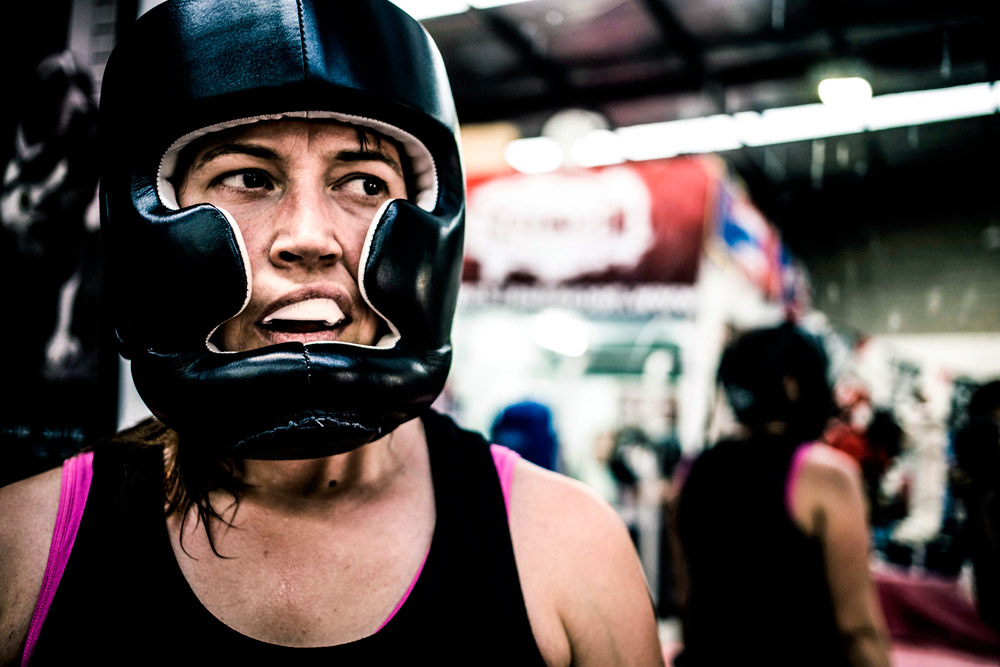
I began paying more attention to others training around me. One afternoon, I watched in awe as Richie trained a 22-year-old pro called Brad Riddell. Richie held pads while Riddell threw kicks and punches at a speed I could only dream of, his small frame showing nothing but muscle.
He was training for an upcoming world title match (which he later won on decision) and for the first time, rather than feeling inadequate and intimidated, I found myself inspired. Kickboxing, I knew then, was a sport of pure beauty. When done properly.
Moments later, Richie approached me, his usually perfect hair a messy array of damp ringlets, and led me onto the brightly coloured mats for our own training.
Training with Richie became a place of comfort. He knew my strengths and weaknesses and played to them throughout our sessions. Pad work became easier, and when times got difficult and I’d be struggling to punch a bag, he would sing loudly — and out of tune — to whatever dance song was on the stereo. The stronger and fitter I got, the more my confidence increased. Training was fun. Training was what I looked forward to.
There were still plenty of days when I felt overwhelmed: tired, aching or just not coping. Richie was pretty good at picking up on those vibes, and often carried me, slowing down the pace. Not that it felt like it at the time. He’d always be pushing past the point of comfort, chatting away at an intense speed about deep life moments and ridiculous things too.
“Let’s work on those non-existent abs,” he said one day, smiling, before telling me about the haircut he got earlier that day.
“Great abs, Amberleigh,” he explained, laughing and grabbing a medicine ball, “come second only to a great haircut.”
I grunted, conscious of my wet fringe stuck to my face, well overdue for a cut, and of my non-existent abs.
“You’re learning Muay Thai, huh?” the phyiso commented on my first visit. “In that case, you’ll be seeing a lot of me.”
If the gym had become my second home, the rooms of the people treating my growing list of physical ailments became my third. I had two physiotherapists I saw regularly, a chiropractor who had reduced me to tears with harsh back adjustments, and four ACC claims for different injuries. I was well accustomed to the disappointed hands-on-hip look of whoever happened to be treating me at the time.
One of the physiotherapists was a professional wrestler. “You’re learning Muay Thai, huh?” he commented on my first visit. “In that case, you’ll be seeing a lot of me.”
As I lay on his table, he massaged my swollen foot, with the by-now-familiar smell of anti-flam filling the room. He talked non-stop about recent fights he’d seen and fighters he respected, stopping the massage every so often to illustrate his fight descriptions by shadowboxing around the table.
Yet, for all the physical pain I was learning to endure, the real battle was mental. I’ve always considered myself emotionally strong, and I’ve overcome a lot in my years, but months of learning to punch and kick and do countless sets of burpees and pushups drove home just how weak minded I could be at times.
The physical pain of training brought the mental pain of everything else to the fore. More times than I remember, I broke down, either before I went to a session, or after, or sometimes in the middle. Every time I found myself getting comfortable with the regime, I’d arrive at the gym to find Richie had a new mental battle waiting for me, and I never felt ready for it.
One day I turned up for a routine session with bags and pads, but instead Richie pointed to the ring and said, “Put your sparring gear on.”
The idea of hitting Richie terrified me more than the idea of him hitting me.
Unsure and nervous, I pulled out my as-yet-unused shin guards and sparring gloves, which are larger than the bag gloves I’d become used to. Richie was wearing the same, his gloves and guards white with gold dragons, mine plain black and white. He strapped my glove for me and said, “Bow before you get in.”
Then he laughed and added, “Man, I’m gonna kick you so hard.”
I was awkward and uncomfortable. I stood in front of him, unsure of how to transfer the drills we’d been doing with pads and bags to an actual person. The idea of hitting Richie terrified me more than the idea of him hitting me. I just stood and waited.
“If you stand in front of me, I’m just working out ways to hit you,” he told me, before throwing his first punch. He moved slowly and carefully, but being in an enclosed space with someone who’s trying to punch me was the most emotionally confronting thing I’ve done in a long time. Going against everything I thought about myself, I threw a few jabs at the hands he had protecting his face.
We danced around for a while, before he dropped his hands. “Hit me,” he said. Before I could even think, I threw a punch that connected with his face. I immediately pulled my hand away and fought back tears. I looked up and Richie was grinning, revealing the bright red of his mouth guard. “Well done,” he said.
I wanted to vomit.
I was not a natural-born fighter. My instinct to run rather than punch would likely hinder my chances at winning a fight, and the decision was made that I was a way off being ready. So a new goal was set. Rather than train towards a fight, we’d look at making the next all-female sparring day — an event designed to give women fighters a chance to spar with one another — something that many women have told me is rare.
Richie seemed to think I’d be fine. I didn’t think I was remotely ready.
On top of that, my right hip had become increasingly painful following a kick one night at training. X-rays and ultrasounds showed nothing serious, but each running or kicking movement increased the pain. I iced it each night, but it was difficult to walk without a limp.
One night during the build-up to the sparring day, I arrived to find a girl about my size, rolling her hand wraps, ready for action. She was there to practise sparring with me, and the feeling of total inadequacy I’d felt many months ago hit me immediately.
This was Margarita, a Russian-born artist with a muscular build and black tattoos covering most of her arms. She was stunningly beautiful, with her hair pulled back and eyebrows perfectly shaping an intense pair of eyes, and I knew right then she could annihilate me in a heartbeat. Doing warm-up sprints up a slight hill in the car park, I tried my best not to reveal how quickly I became out of breath.
As we were putting on our sparring gear, I heard Richie talking to her. “Don’t go as hard as you do with me,” he said. “She’s just learning.”
That made me feel even worse. We danced around each other for a while, jabbing half-heartedly at each other, but I was too scared to throw any real punches. I tried to remember the combinations I’d learnt but I couldn’t think of anything, and just threw blind punches with the left and right. Rita was dancing around me, too, waiting, letting me get comfortable.
“Hit her,” Richie told her from the side of the ring. “If she doesn’t block properly, just hit her.”
So she did. I did my best to block and finally managed to get in a jab that connected. Immediately I dropped my guard. “Shit,” I whispered. “Sorry!”
She smiled and punched me back.
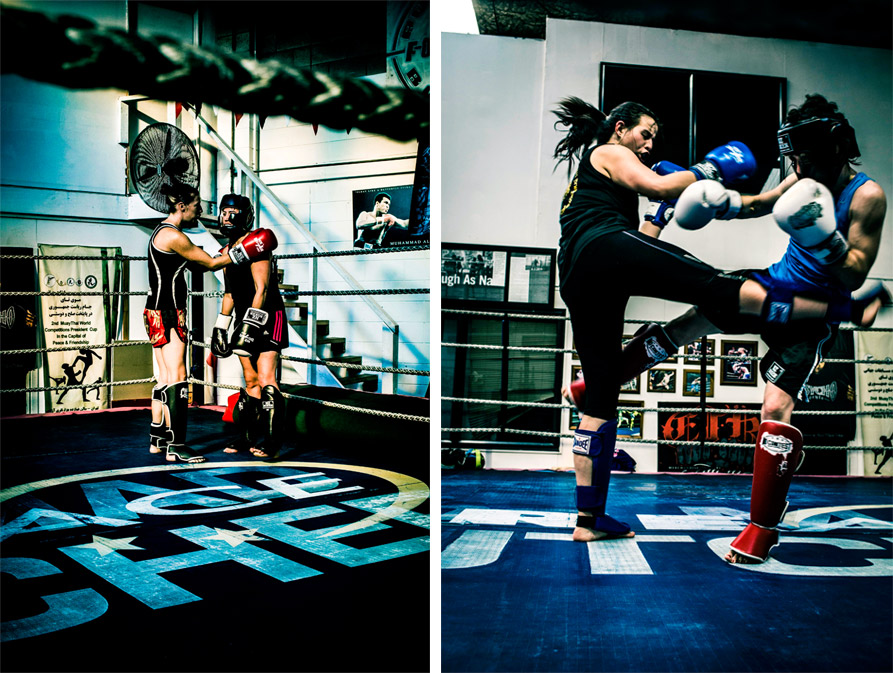
It’s the final week and I am so nervous. It’s not just the pressure I’ve put on myself — I feel like Richie’s own reputation is on the line. I don’t want to embarrass myself, but I really don’t want to embarrass him. “More practice would be good,” he texts me. We have the terrible session with the tears and freakouts.
When the day arrives, I get in the car about three hours early and drive around, cranking punk music as loud as it will go and try desperately not to think about what I’m going to do.
At the venue, ETK (Elite Thai Kickboxing) in Penrose, there are girls in Muay Thai shorts walking around in the car park outside. They’re tall, slim and muscular, and they chat freely to one another like old friends. Once again, I am a total outsider. Everyone else is family, and I’ve felt like I’ve been in that family at the gym, but I don’t feel it now.
Inside, it’s a gym like all the others. Photos of boxers and posters for events decorate the white-painted brick walls. An empty boxing ring sits to the left and gear bags, shoes and half-empty water bottles are scattered around the walls. At the back is a row of punching bags, and in front an empty area of brightly coloured mats. A typed note hangs from the doorway reminding everyone to remove their shoes and bow when entering.
It’s too late to back out now.
About 15 of us have turned up for the sparring, plus trainers, family and hangers-on. Most but not all the women are younger than me, and everyone is busy wrapping their hands or warming up with skipping and shadowboxing. There’s a young girl, about half my size, with enormous white gloves at the ends of her tiny arms. She’s not the first child I’ve seen around the gyms, but I’m still amazed every time I come across them. I envy their fearlessness.
Richie pulls me aside to warm up with him and I try to hide my fear, try not to look at the other girls, who are all so obviously more confident than me.
I don’t feel remotely lethal, and I don’t feel much like a lady either.
Michelle, the friendly woman in charge, makes a speech. She says the day is a chance for us girls to learn from one another and practise sparring with other women. It’s a round robin, and we’ll all have two two-minute bouts with each other fighter. It’s all a bit of fun, and if someone’s hitting too hard, it’s fine to tell them so. I feel sure I’ll be doing a lot of that.
Even the name of the event has intimidated me: Lethal Ladies. I don’t feel remotely lethal, and I don’t feel much like a lady either.
We pair up and I find myself standing next to a woman of slim build, taller than me and with incredible muscle definition in her thighs. She smiles and the black of her mouthguard shows. Her black singlet shows up the muscles in her back and shoulders. She’s so intimidating.
Until she speaks. “Sparring for the first time is scary, huh?” she says, reaching out and putting her arm on my shoulder. “You’ll be fine.” She leans in to give me a hug. Moments later, a buzzer sounds, she steps back and we touch gloves, dance around each other and start punching.
I take a series of jabs to the face and miss blocking a good number of kicks, but I manage to get in a few shots of my own. From the side I can hear Richie reminding me how to block kicks properly. Before I know it I hear the buzzer again. I stop, breathing hard, smile at my opponent and suddenly realise something. I’m having fun.
The round-robin sparring sees me paired with six different women. Each time we approach one another we smile, introduce ourselves and chat a little before trying to land punches and kicks on each other.
Everyone — every single fighter — is welcoming and friendly. You expect some sauntering, some swagger designed to intimidate. You expect everyone to present as tough. Instead, I’m greeted all afternoon with smiles, pats on the back and constant encouragement and advice.
Suddenly, it’s over. I’m tired, red marks are showing up on my thighs and my hair is drenched in sweat. Somehow I have completed 12 rounds of sparring with girls I’ve never met and I’ve come out of it unscathed, exhausted and exhilarated.
Richie comes over as I sit on a bench, elbows on knees. “I’m proud of you, kid,” he says, smiling and patting my head. I try to play it cool, but I’m pretty proud, too.
“Now put your shin guards on. You need to practise your blocking.”
Did fighting save my life? I’m not sure. But it did give me a purpose at a time when I desperately needed it.
Would it have been different if I’d done this when my brother was still alive or when his death was a distant memory? Of course. There’d have been less heartache for me and fewer headaches for Richie.
But even so, I’m not sorry I’ve done it this way. I’ve never known such pain, physical or emotional, as I’ve had to endure over the past year. And the upside, because there is an upside, is that it’s made the triumphs sweeter.
As I write this, I’m lying on my side with an ice pack on my hip and my thighs are covered in painful black bruises. In the corner of the room are my gloves, headgear and tubes of Deep Heat. But despite the aching hip, the Forrest Gump leg and the fact my footwork would shame any co-ordinated white girl, we’re continuing the training.
I’m gonna have a real fight. I’m not sure when, and I do suspect that when it happens I’ll still be wanting to apologise to my opponent every time I hit her. But I’m not ready to stop yet.
Besides, I’ve got another goal: one day, I’m going to land a clean shot on Richie Hardcore’s face.

